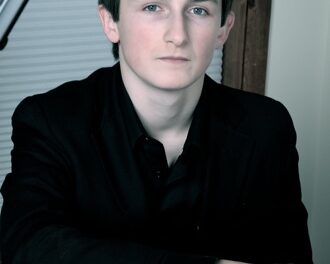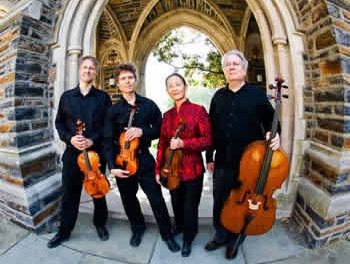Pianist Simone Dinnerstein, the one-time Brooklyn teacher who achieved cult status virtually overnight, following the release of her self-produced CD of Bach’s Goldberg Variations, returned to Durham for a Reynolds Industries Theater recital presented by Duke Performances. The event had a lot of the trappings of pop stardom: pre-concert recorded music, leafy projections on the shell panels behind the piano, a brass floor lamp to the left of the keyboard, and dimmer-than-usual lighting, all saying in muted but nonetheless certain terms “mood” and “atmosphere” long before the artist came on stage and positioned herself on the bench to begin the program.
The place was packed, and there were many young people in attendance. She’s built up quite a local following in the wake of her programs here – on her own and then with Zuill Bailey in 2009 and with Tift Merritt in 2011. (She also opened the Asheville Symphony’s season last fall with the Ravel Concerto.)
This program hewed toward stardom in another way, for it was basically a CD-release tour like those offered by singer-songwriters of note. As DP director Aaron Greenwald explained, 3/4s of the program – two Bach partitas and Schubert’s Impromptus (D.899) – came from her just-released Sony CD, Something Almost Being Said, on sale in the lobby before, during,* and after the show.
The starting point for the program, she explained, was song, but while the major composers featured – Chopin, Brahms, Bach even, Schubert, and Schumann (whose music was heard as an encore) – wrote songs, none of their compositions in that category was heard. Perhaps Chopin’s Nocturne in D-flat, Op. 27/2, and maybe even Brahms’ Intermezzo in A, Op. 118/2, could pass as vocalises (although most pianists would object), but I think no parts of the Bach Partitas (as played, Nos. 2, in C minor, S.826, and 1, in B-flat, S.825) or any of Schubert’s four Impromptus, D.899, could handily be adapted to vocal performance. The only item on the program that began life as a song was Leonard Cohen’s “Suzanne,” here done up in an inconsequential set of variations by Daniel Felsenfeld (b.1970) that had been premiered at Duke during the aforementioned Tift Merritt concert. (The piece went unmentioned in CVNC‘s review of that program.)
The Chopin, Cohen-Felsenfeld,** and Brahms were played without intervening pauses as a sort of dream sequence that, as given, sounded like a trio of lullabies. (A distinguished piano scholar wondered aloud at intermission if the last part really was Brahms, so slow and idiosyncratic was the playing).
The Second Bach Partita came as a relief, but its slow movements were very, very slow, so much so, indeed, that one wondered if the melodic lines would at some point simply halt in mid-air. The playing was all very clear and precise, and Dinnerstein obviously has more than ample technique, but the interpretations throughout the evening seemed driven a good deal more by the mood and program concept (songs, remember) than by any sort of informed awareness of how these scores should be delivered.
Following the intermission, Dinnerstein positioned herself for the Schubert, in which the slow passages were again very, very slow. There was agility in the faster parts, and there was some elegance, but idiosyncrasy reigned – as was the case again in the First Partita, which brought the formal part of the program to a close. Wanda Landowska famously said, “You play Bach your way, and I’ll play him his way.” The Bach we heard – and the rest of the program, including the Schumann encore – clearly reflected Dinnerstein’s way. The recital ended about 10:10 p.m. with many standees applauding and some yelling “bravo!”
For others, it was a very long night.
Did I mention the atmosphere?
*That is to say, at intermission….
**Hear the Variations, via NPR, here,
The next recital in this series will be presented by Garrick Ohlsson on March 16; for details click here. He also appears the next night with the Takács Quartet; for details of that click here.












